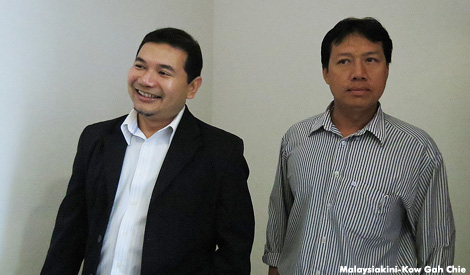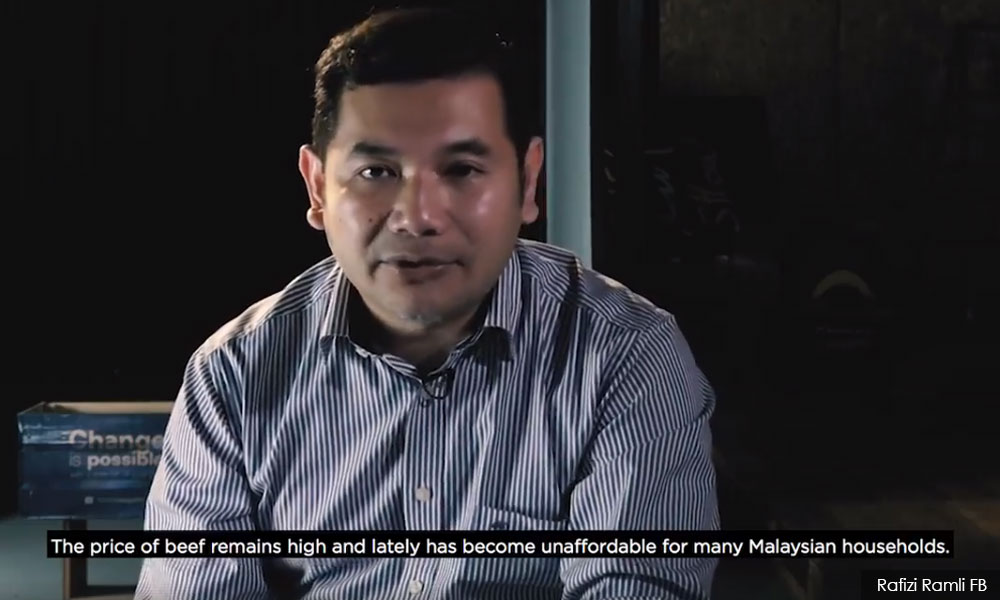
Would you be willing to go to jail for something you believe in?
30 months in jail. That is the price Pandan MP Rafizi Ramli and former Public Bank clerk Johari Mohamad are paying for something they believed in.
A bank clerk is very good at putting things in order. One day he finds data that could indicate the money trail of misused public funds. Anxious, he hands it to a politician. His heart stops racing momentarily. The politician investigates further and finds no cows. RM250 million later, still no cows.
Instead, we have 30-month imprisonments for the man and the politician. Isn’t there something wrong?
Isn’t there something wrong with our criminal justice system when we convict people too easily and sentence too excessively? Isn’t there something wrong when our judges are not tempered with judicial sensibilities of justice and mercy? Isn’t there something wrong when good people with good intentions go to jail?

When Rafizi first investigated the National Feedlot Corporation scandal, he wasn’t well known to the public. At that time, both Johari (on right in photo) and Rafizi were simply ordinary citizens who couldn’t stand the smell of alleged corruption and abuse of power.
Injustice is not something only known to academic scholars or moral philosophers; injustice is something universally and timelessly felt – everyone can smell it.
Some sceptics are cynical of Rafizi’s singular devotion to truth. They say that all of this is merely a ploy in his journey to martyrdom.
But we would be damned to think that this is a self-serving journey. One conviction resultant from the struggle for truth is one conviction too many. Prison walls are supposed to house only those who present an imminent threat to society – the “worst of the worst”.
Prisons are placed at the lowest rung of every social hierarchy, since its primary purpose is to punish unacceptable actions and behaviours. It does so by removing your physical mobility, torturing your mental authority and decimating the last of your soulful existence.
If we look at what Rafizi has done since the eve of his political career, and at the insurmountable courage of ordinary people like Johari, they hardly fit the description of being the worst of the worst of our society.
In fact, people like them ought to be exemplary reminders of what ordinary people can do. Words like “justice,” “truth,” and “struggle” find their owners in men like these.
Actualising idealism
Rafizi and Johari had everything to lose. Rafizi was the youngest senior manager at Petronas and could have remained and risen spectacularly through its corporate ranks.
Instead, he chose to expose the NFC scandal, which first sent him to the cunning world of politics - and now to prison. Once he was at the very top of the mountain; now he is forced to march to the lowest abyss of prison cells.
Johari was a bank clerk living from hand to mouth. He knew that he would have his livelihood forfeited if he was to be served with imprisonment. Many called him an “ordinary” bank clerk – but I refuse, for he is anything but.
Many of us are idealistic when we are young. Our aspirations for how society should be are a central part of our being.
But as we get older, we are told to be more practical. We are told to “earn money first, do justice later”. We are told, “Dear, no one pays you to fight for justice; you only pay dearly.”

The rat race of adult life reveals that your youthful idealism is actually just naïve foolishness. So maybe Rafizi and Johari were indeed just a foolish pair who believed fairness and justice were possible for humanity.
But maybe - just maybe - they are who we are if we had a heart of steel and spirited moral courage. Maybe they are who we want but are too afraid to be. Maybe a part of them is a part of who we are.
The process of combating evil is so terrifying that we need courageous soldiers to walk into the fire first. If idealism is the fire in your belly, then actualising idealism means walking through the fire.
After all the words of tongue and pen, this question visits me again and again: Would you be willing to go to jail for something you believe in?
JAMES CHAI works at a law firm. His voyage in life is made less lonely with a family of deep love, friends of good humour and teachers of selfless giving. This affirms his conviction in the common goodness of people: the better angels of our nature. He tweets at @JamesJSChai. -Mkini



No comments:
Post a Comment
Note: Only a member of this blog may post a comment.